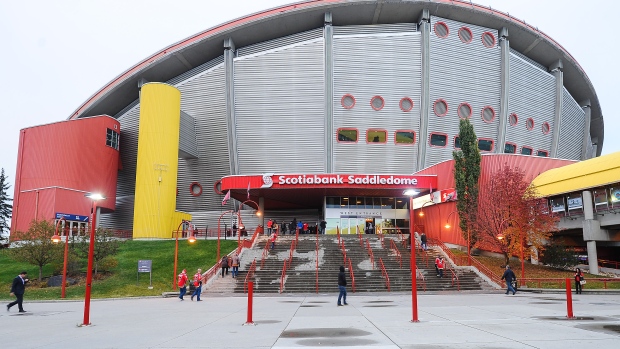Sep 21, 2017
Flames: Team offered $275M for new arena
The Calgary Flames say they are giving up on their hopes to build a new arena to replace the Scotiabank Saddledome. The Flames announced on Thursday the team was willing to contribute $275 million up front for the proposed public arena, but see no way forward with the city.
The Canadian Press

CALGARY — No longer talking to each other behind closed doors about a new NHL arena, the Calgary Flames and their city continue to talk loudly to the public about it.
The Flames disclosed what they think they should pay for a new arena early Thursday morning via a press release and newspaper ads in a rebuttal to the city revealing its financials last week.
Calgary Sports and Entertainment said they were willing to contribute $275 million of their own money before they ended negotiations with the city.
CSEC thinks the city can raise $225 million via a community revitalization levy (CRL), which is tax collected from new development that springs up around a new arena.
"In a 'small market' city, even one with an NHL team, a privately funded arena is not economically viable," CSEC said in a statement.
"The city's proposal is just not workable (or even for that matter 'fair') based on other arena deals in comparable cities."
CSEC owns the Canadian Football League's Calgary Stampeders, Western Hockey League's Hitmen and National Lacrosse League's Roughnecks in addition to the NHL's Flames.
The ownership group is comprised of Murray Edwards, Alvin Libin, Clayton Riddell, Allan Markin and Jeff McCaig.
CSEC repeated their position stated a week ago they will no longer talk with the city about building a new arena, but will continue to make the 34-year-old Saddledome work for their teams for now.
"After two years of discussions, the Flames see absolutely no basis upon which a new agreement can be achieved with the city and have concluded that there is no point to continue the pursuit of a new arena in Calgary," their statement said.
The city proposed a three-way split on the cost of a $555-million arena, with the city and the Flames each paying $185 million and the remaining third raised from a surcharge on tickets sold to events in the new building.
The city said the Flames would control the new arena and receive all revenue from it.
Flames president Ken King contended the city's plan amounted to the team paying the entire cost, or more, because CSEC considers a ticket surcharge paid by users revenue that belongs to the team and because the city wants CSEC to pay property tax.
CSEC declared it was breaking off talks the day after Calgary Mayor Naheed Nenshi spoke of his vision for a revitalized Victoria Park that included a new hockey arena.
Nenshi is running for a third term in the Oct. 16 civic election. King will keep the arena at the forefront of election buzz when he speaks to the chamber of commerce Monday.
The Flames say their $275 million contribution would be "similar to prepayment of rent for 35 years of tenancy."
The $890-million CalgaryNext project proposed by the Flames in 2015 included an arena, football stadium and fieldhouse on the west side of downtown.
But city administration pegged the price tag of that project at $1.8 billion and council showed more enthusiasm for building an arena in Victoria Park just north of the Saddledome.
As for raising almost quarter billion dollars from taxing commercial development around a new arena, Nenshi said last week that's not a slam dunk.
"We've seen that the Saddledome has not achieved anything in terms of development around it, in terms of helping Victoria Park," Nenshi said. "We pretty much razed Victoria Park and put parking lots there.
"That Jimmy Buffett's Margaritaville never came."
Rogers Place opened in Edmonton just over a year ago. The arena and the cavernous hall leading into it that serves as public meeting space cost $540 million, according to the city's website.
The Edmonton Arena Corporation headed by Oilers owner Daryl Katz committed $137.8 million to those two elements.
The city contributed $81 million and planned to raise $170 million via a CRL. The city also threw in another $125 million to be paid back via a ticket surchage.

